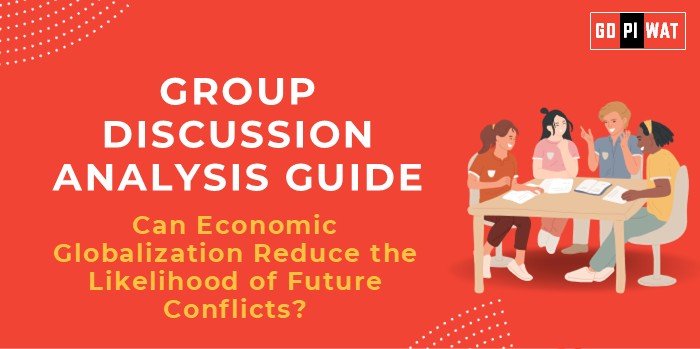📋 Group Discussion (GD) Analysis Guide
🌐 Can Economic Globalization Reduce the Likelihood of Future Conflicts?
📖 Introduction to the Topic
Opening Context: Economic globalization, marked by interconnected markets, multinational corporations, and integrated supply chains, has become a cornerstone of modern geopolitics. It raises a pertinent question: can these economic ties foster peace and deter conflicts?
Topic Background: Historically, theories such as “capitalist peace” suggest that trade interdependence reduces the likelihood of war. The aftermath of World War II and the establishment of institutions like the WTO exemplify how economic globalization aimed to stabilize international relations. However, events such as the Russia-Ukraine war challenge this narrative.
📊 Quick Facts and Key Statistics
- 🌍 Global Trade Volume: $32 trillion in 2023, reflecting unprecedented interconnectedness (WTO 2023).
- 🏢 Multinational Corporations: 60% of global GDP driven by cross-border entities (World Bank).
- 📉 Conflict Reduction Claims: Trade interdependence reduced conflicts by 15% from 1990 to 2020 (Stockholm Peace Research Institute).
- ⚖️ Economic Sanctions: 30+ major sanctions in 2022; effectiveness remains debatable.
🌟 Stakeholders and Their Roles
- 🏛️ Governments: Create trade agreements and regulate sanctions.
- 🌐 International Organizations (e.g., WTO, UN): Mediate trade disputes and encourage peaceful resolutions.
- 🏢 Private Sector: Influences global supply chains and economic integration.
- 👥 Civil Society: Advocates for equitable and conflict-sensitive globalization policies.
🏆 Achievements and Challenges
✨ Achievements
- ✅ Trade Interdependence: Countries with high trade ties (e.g., EU) show reduced intra-region conflicts.
- ⚖️ Economic Sanctions: Tools for non-violent pressure (e.g., Iran’s nuclear program negotiations).
- 🌍 Global Institutions: Frameworks like WTO and IMF promote stability.
⚠️ Challenges
- 📉 Economic Inequality: Disparities in globalization benefits (e.g., developing vs. developed countries).
- ⚔️ Weaponization of Trade: Economic blockades leading to humanitarian crises (e.g., Yemen).
- 🌐 Geopolitical Rivalries: Nationalistic policies (e.g., US-China trade war) undermine global stability.
📘 Global Comparisons:
– EU Model: Effective trade-driven peacekeeping.
– US-China Rivalry: Globalization failing to bridge political divides.
– Case Studies:
– South Korea and Japan: Trade disputes resolved diplomatically via economic ties.
– Russia-Ukraine Conflict: Trade failed as a deterrent to aggression.
💬 Structured Arguments for Discussion
- ✅ Supporting Stance: “Economic globalization fosters mutual dependencies, reducing incentives for war.”
- ❌ Opposing Stance: “Nationalistic interests often override economic ties, leading to conflicts.”
- ⚖️ Balanced Perspective: “While globalization has its merits in reducing conflicts, it requires equitable structures to address disparities.”
💡 Effective Discussion Approaches
- 🌏 Opening Approaches:
- Highlight statistical evidence on reduced conflicts due to trade.
- Discuss historical precedents like the EU.
- Present a case study (e.g., South Korea-Japan economic diplomacy).
- 🤔 Counter-Argument Handling:
- Reframe by acknowledging limitations and proposing equitable trade practices.
- Provide examples of successful trade agreements fostering peace.
🔍 Strategic Analysis of Strengths and Weaknesses
- 💪 Strengths: Interdependence, institutions fostering peace.
- ⚖️ Weaknesses: Economic disparities, potential for exploitation.
- 📈 Opportunities: Global trade agreements as peace mechanisms.
- ⚠️ Threats: Nationalism, economic weaponization.
🎓 Connecting with B-School Applications
- 🌍 Real-World Applications: Insights for global trade strategies, geopolitical risk analysis, and international business roles.
- 💬 Sample Interview Questions:
- “How does economic globalization influence conflict resolution?”
- “Can trade sanctions effectively deter wars?”
- 💡 Insights for B-School Students:
- Economic globalization provides frameworks for policy-making, risk management, and CSR in conflict zones.


